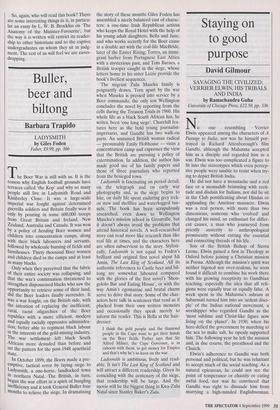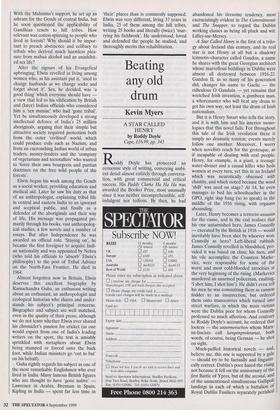Staying on to good purpose
David Gilmour
SAVAGING THE CIVILIZED: VERRIER ELWIN, HIS TRIBALS AND INDIA by Ramachandra Guha University of Chicago Press, £22.50, pp. 336 No one resembling Verrier Elwin appeared among the characters of A Passage to India, nor was he himself por- trayed in Richard Attenborough's film Gandhi, although the Mahatma accepted him as a disciple and regarded him as a son. Elwin was too complicated a figure to fit into the stereotypes which even percep- tive people were unable to resist when try- ing to depict British India.
He did not have a moustache and a red face or a memsahib brimming with recti- tude and disdain for Indians, nor did he sit in the Club pontificating about Hindus or applauding the Amritsar massacre. Elwin was a real person, with more than two dimensions, someone who 'evolved' and changed his mind, an enthusiast for differ- ent causes, a man who journeyed from priestly austerity to anthropological promiscuity without cutting the essential and connecting threads of his life.
Son of the British Bishop of Sierra Leone, Elwin gained a first in Theology at Oxford before joining a Christian mission in Poona. Although the mission's spirit was neither bigoted nor over-zealous, he soon found it difficult to combine his work there with his growing receptivity to Gandhian teaching, especially the idea that all reli- gions were equally true or equally false. A week spent in the Mahatma's ashram at Sabarmati turned him into an 'ardent disci- ple' of the Indian national movement, a worshipper who regarded Gandhi as the `most sublime and Christ-like figure now living on the planet'. In 1930, when his hero defied the government by marching to the sea to make salt, he openly supported him. The following year he left the mission and, in due course, the priesthood and the Church.
Elwin's adherence to Gandhi was both personal and political, but he was reluctant to accept much of the social teaching. As a natural epicurean, he could not see the point of temperance or chastity or eating awful food, nor was he convinced that Gandhi was right to dissuade him from marrying a high-minded Englishwoman. With the Mahatma's support, he set up an ashram for the Gonds of central India, but he soon questioned the applicability of Gandhian tenets to hill tribes. How relevant was cotton-spinning to people who lived in forests? Why should it be impor- tant to preach abstinence and celibacy to tribals who derived much harmless plea- sure from mahua alcohol and an uninhibit- ed sex life?
After the rigours of his Evangelical upbringing, Elwin revelled in living among women who, as his assistant put it, 'used to change husbands as we change socks and forget about it'. Sex, he decided, was 'a good thing' which everyone should have a view that led to his vilification by British and (later) Indian officials who considered him a 'sex maniac' who had 'gone tribal'. Yet he simultaneously developed a strong intellectual defence of India's 25 million aboriginals, arguing that their simple but attractive society required protection both from the outer 'civilised' world, which could produce evils such as Nazism, and from an encroaching Indian world of urban traders, money-lenders and the 'company of vegetarians and teetotallers' who wanted to 'force their own bourgeois and puritan doctrines on the free wild people of the forests'.
Elwin began his work among the Gonds as a social worker, providing education and medical aid. Later he saw his duty as that of an anthropologist, explaining tribal life in central and eastern India to an ignorant and sceptical public, and finally as a defender of the aboriginals and their way of life. His message was propagated pri- marily through his books, vast anthropolog- ical studies, a few novels and a number of essays. But after Independence he was awarded an official role. 'Staying on', he became the first foreigner to acquire Indi- an nationality and was appointed by Nehru (who told his officials to 'absorb' Elwin's philosophy) to the post of Tribal Adviser on the North-East Frontier. He died in 1964.
Almost forgotten now in Britain, Elwin deserves this excellent biography by Ramachandra Guha, an enthusiast writing about an enthusiast, an anthropologist and ecological historian who shares and under- stands his subject's principal concerns. Biographer and subject are well matched, even in the quality of their prose, although we do not learn whether Elwin ever shared his chronicler's passion for cricket (as one would expect from one of India's leading writers on the sport, the text is amiably sprinkled with metaphors about Elwin being stumped or forced onto the back foot, while Indian ministers go 'out to bat' on his behalf).
Guha rightly regards his subject as one of the most remarkable Englishmen who ever lived in India. Many famous British figures who are thought to have 'gone native' Lawrence in Arabia, Brennan in Spain, Kipling in India — spent far less time in `their' places than is commonly supposed. Elwin was very different, living 37 years in India, 25 of them among the hill tribes, writing 25 books and literally (twice) 'mar- rying his fieldwork'. He understood, loved and defended the people he studied, and thoroughly merits this rehabilitation.



























































 Previous page
Previous page